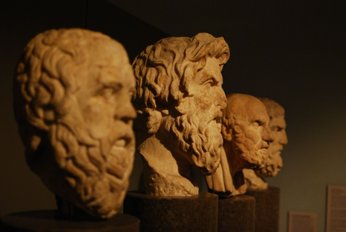In the World of Crisis Headlines, Is Philosophy a Waste of Time?
Philosophy is one of those topics that seems to belong in some ivy-covered building being discussed by men in vests who punctuate pronouncements by pointing with a pipe stem and women in fine dresses holding tea cups with their pinky fingers aloft.
The default Google dictionary tells us that philosophy is “the study of the fundamental nature of knowledge, reality, and existence…” which tends to confirm the image above and makes it sound like pretty heady stuff. Even the derivation—the word stems from ancient Greek and literally means “love of wisdom”—sounds like a luxury that people living and working in the real world can’t afford.

But if we look a little closer we can see that philosophy underlies everyday life and the actions that shape our world.
The Nazi philosophy that treated so many lives as worthless gave us a living nightmare in the Holocaust. The materialistic, psychiatric view that men are just animals in need of control gives us rampant drugging of hundreds of millions, including children. And, of course, there is the other side. Mother Teresa’s philosophy of the value of all life gave us an awe-inspiring example of care for the poorest among us. Martin Luther King, Gandhi and others exemplified the philosophy that all men and women have rights and were created equal.
These are far-flung, extraordinary examples, but we can see philosophy at work in our homes and our communities too. The parent who berates or hits a child for stepping out of the grocery store checkout line is dramatizing a certain kind of philosophy about children. But, so too do the busy, working parents who yet make time every week to coach kids on the local baseball team.
Philosophies are ideas about life inextricably tied to behavior and actions. They have an impact in the real world. In fact, they make up and define the real world which we build and in which we live.
Such are examples of another, more down-to-earth, equally valid definition of philosophy: “a theory or attitude held by a person or organization that acts as a guiding principle for behavior.”
Sometimes these philosophies to guide action are developed before the action; sometimes they come to life after-the-fact, to explain, justify or cover up some act already completed. The petty workplace thief might voice the view that employers “deserve to be ripped off because of how they abuse their workers” after he’s stolen a crate of office supplies. On a larger scale, as pointed out recently in an article in the American Scientist, we see claims that opioid addiction is a “brain disease” treatable by giving addicts more opioids after addictive opioids like methadone and Suboxone were in use and selling well.

But whether the philosophy came first or as an afterthought, we can see that philosophies are ideas about life inextricably tied to behavior and actions. They have an impact in the real world. In fact, they make up and define the real world which we build and in which we live.
I realized recently in going through a chronological study of the Basic Books of Dianetics and Scientology what a unique approach Mr. Hubbard took when he developed what we know today as Scientology.
Often, the impact of a philosophy isn’t known for years. A Karl Marx sits down and philosophizes about the nature of humankind and society, but we don’t see the results until decades later when authoritarian regimes develop, that are at least ostensibly based on his principles. An Eleanor Roosevelt works with the United Nations to develop and garner agreement on the Universal Declaration of Human Rights. More than half a century later, the philosophy of equality embodied in its articles is only now becoming known and, where known, we can see its transformative power.
But, in the case of the development of Dianetics and Scientology, as well as the way it operates today, philosophy and action have always been intimately and immediately related.

Mr. Hubbard began Dianetics with fundamental, philosophical ideas: that Man is basically good, that the urge to survive is the dynamic principle underlying our motives and that that urge expresses itself in the form of the individual, the family, the groups to which we belong and the human race as a whole.
That philosophy was wedded to a new technique of counseling he termed “auditing.” This meant the philosophy was tested immediately and directly in the crucible of life. And the passing standard for the test was always whether auditing could be used to make someone happier, more able and more competent in his or her life with a better understanding of others and an improved ability to help.
Something interesting happened thanks to the instantaneous feedback Mr. Hubbard received. Not only did auditing provide a testing ground for the basic philosophy, but it revealed new phenomena to inform and guide new philosophical directions. For example, in application of the philosophy through auditing, it became clear to Mr. Hubbard that he was not dealing with just physical bodies enlivened by complex, neurochemical reactions, but with something more—something that looked very much like something spiritual. From this and many other discoveries, the religion of Scientology was born.
Each subsequent advance in philosophy led directly to advances in auditing—testing, correcting, validating the philosophical at every step.
Moreover, this wasn’t an isolated journey. With the original publication of Dianetics: The Modern Science of Mental Health in 1950, millions of other people got involved, testing and validating the philosophy and its related techniques, providing a nationwide (and later worldwide) proving ground.
Scientology is, then, somewhat unique in the world of philosophy. It has always been tied immediately and intimately to action—to validation in the real world not just by its Founder but by millions. To this day, Scientology is approached in three ways:
- By studying the underlying philosophy, available widely in Mr. Hubbard’s books and lectures.
- By training in auditing techniques—which may be as simple as studying and applying one of the books or as formal as a multi-month course in precision application. Because of this, students of Scientology are able to follow the steps taken by Mr. Hubbard and determine for themselves whether the philosophy works or not. The test of the philosophy of Scientology didn’t just occur years ago and now resides in ponderous, dusty books, but happens millions of times a day in places large and small around the globe. It is personal, immediate and vibrant.
- By receiving auditing. In other words, experiencing the personal benefits of application of the religious philosophy of Scientology. As ever, the test remains the same: did the auditing help make me happier, more able, more competent in my life, with a better understanding of my fellows and an improved ability to help?
To a Scientologist, philosophy is not something random. It is not a disconnected, ethereal subject only applicable to erudite conversations in stuffy, secluded country clubs.
It is about life and how we live it. It is about the world we’d like and the one we create. It is about our families, our friends, our communities and the quality of the life we all lead. It is something intrinsic, something shared amongst us and yet something deeply personal for each of us.
So, perhaps, in the end, the answer to the question “does philosophy really matter?” has become pretty obvious.










